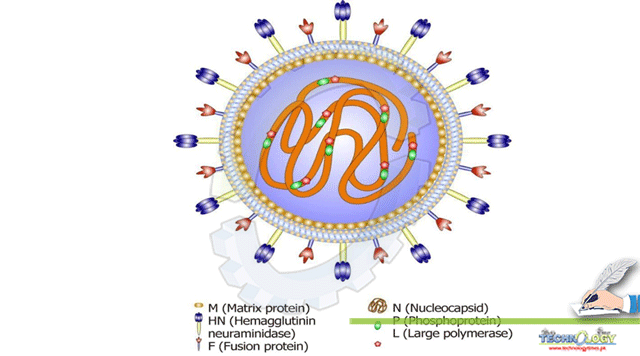The poultry sector is the most vibrant part of agriculture which contributes handsomely to meet the protein demand of Pakistan.

By Dr. Toseef Jamil and Prof. Dr. Farzana Rizvi
Among meat production, about 24% of meat demand is fulfilled by poultry. Considering the world’s largest poultry producer, Pakistan is considered now at 11th rank (Pakistan Economic Survey, 2020-21). On the other hand, poultry performance is being affected by infectious and noninfectious diseases among which Newcastle disease is a big culprit.
Newcastle disease in chickens is a disease characterized by mild to severe respiratory troubles (coughing, sneezing, and rales) with marked diarrhea depending on the severity of the disease along with lethargy, stress, loss of egg production, ruffled feather, conjunctivitis, and depression. Disease symptoms can cause neurological signs as well. Chickens are particularly susceptible and may experience morbidity and mortality rates up to 100%. It can affect any kind of poultry farm, from the backyard to large commercial poultry farms.
Causative agent:
Newcastle disease (ND) is a member of the family Paramyxoviridae in the genus Avulavirus. Twelve serotypes of these viruses (APMV-1 through APMV-12) have been identified in birds. The viruses that cause Newcastle disease belong to avian paramyxovirus type 1 (APMV-1) and are also called Newcastle disease viruses (NDV). Its structure consists of 7 proteins as mentioned in the figure.
APMV-1 viruses have been classified into three or more pathotypes based on their virulence in chickens. Lentogenic strains are the least virulent, mesogenic strains are moderately virulent, and velogenic strains are the most virulent.
Based on pathogenicity index, Lentogenic strain (less pathogenic) generally results in subclinical disease, mesogenic strain (moderately pathogenic) causes typically clinical signs of disease with low mortality and velogenic strain (highly pathogenic) causes high mortality in infected birds. Velogenic viruses can be subdivided into two groups: strains that cause a neurotropic form, typically associated with respiratory and neurological signs, and strains that cause a viscerotropic form with hemorrhagic intestinal lesions.
Transmission
Direct contact with secretions of infected birds; principally via ingestion (fecal/oral route) and
inhalation.
Fomites: feed, water, implements, premises, human clothing, boots, sacks, egg trays/crates, etc.
Survival of agent is prolonged by presence of feces, as in soiled eggshells.
Hatching chicks may be infected through egg for some NDV strains; transmission of highly virulent isolates is uncommon. No clear evidence of role of flies in mechanical transmission.
Clinical diagnosis
Clinical signs seen in birds infected with NDV vary widely and are dependent on factors such as: the virus/pathotype, host species, age of host, co-infection with other organisms, environmental stress and immune status. Clinical Signs are as below according to strains.
|
Lentogenic strain |
Mesogenic Strain |
Velogenic strain |
|
Usually associated with subclinical disease marked by mild respiratory disease; coughing, If other co-infectious agents circulating, can result in severe signs |
May produce cause acute respiratory disease and neurologic signs in some species Mortality rate is usually low (<10%) If other co-infectious agents circulating, can result in severe signs |
Most commonly cause severe disease in chickens with mortality; signs principally respiratory and/or nervous As the disease progresses birds may develop greenish or white watery diarrhoea, dyspnoea and inflammation of the head and neck often with cyanotic discoloration Sharp drop in egg production; eggs contain a watery albumin and appear misshapen with abnormally coloured, rough or thin shells Morbidity and mortality rates may approach 100% in unvaccinated chickens |
Effects of Peppermint
Mentha piperita, commonly known as peppermint has shown anti-inflammatory, antioxidant, antiviral, antibacterial, hepatoprotective, immunomodulatory, antifungal, and even anti-tumor properties. Peppermint has the ability to strengthen the immune system and performance of birds. Peppermint leaves have high growth-stimulating effectiveness. Peppermint oil is also a moderate carminative and treats significant intestine disorders that cause stomach discomfort.
Composition of Peppermint
Mentha piperita contains a variety of constituents, including menthol (29–48%), menthone (20–31%) has therapeutic effects throughout the plant including leaves and flower.
Mechanism of action of peppermint on immune system
Menthol, as an active ingredient in peppermint leaves exhibits immunomodulatory activity via decreased cytokine levels in poultry tissue, pro-inflammatory cytokines TNF-α and IL-6, and increased anti-inflammatory factor IL-10. The therapeutic application of peppermint leaves has recently grown internationally, including treating a variety of illness problems such as allergies, respiratory issues, and musculoskeletal problems.
Immunomodulatory effects of Peppermint against ND
Peppermint essential oil has an immunostimulant impact on the humoral and cell-mediated immune responses to ND virus in broilers. The peppermint and eucalyptus essential oils combined has a greater beneficial impact on antibodies titers against NDV. The supplementation successfully suppress vVND infection, indicates an immunomodulatory effect and elicit boosted immune response against ND virus. Broilers with peppermint have shown a greater yield.
Conclusion
Newcastle disease virus (NDV) causes an acute infectious disease in poultry and wild birds with high morbidity and mortality. Peppermint being the organic compound have strong immunomodulatory effects with no or minimum side effects against Newcastle disease in broilers. It has antioxidant and anti-inflammatory effects. It decreases cytokines levels hence enhance immunity.